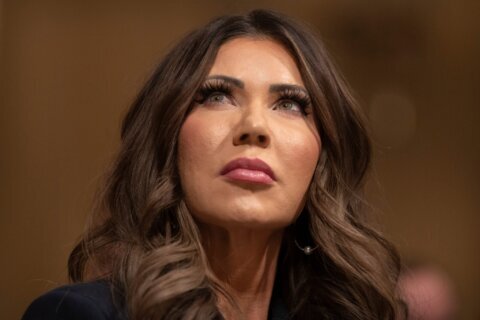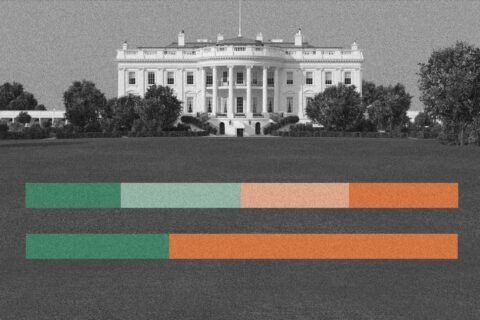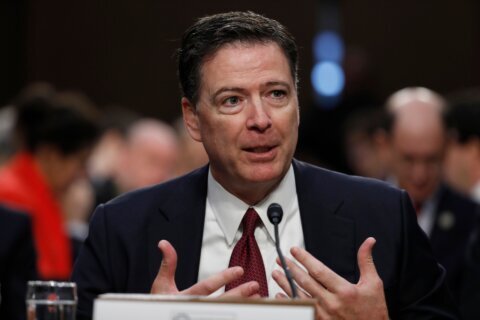WASHINGTON — The morning after the Democratic candidates for president in 2016 debated for the first time in Las Vegas, the consensus among political observers on WTOP held that former Secretary of State Hillary Clinton was the big winner.
CBS Congressional Correspondent Nancy Cordes says Clinton won Tuesday night’s debate not only on substance but style, saying the former secretary of state, senator and first lady projected passion and likability, while literally laughing off some of the attacks against her.
“I think she was very good, and her opponents made her look even better,” says Chuck Todd, NBC news political director and host of “Meet the Press.”
Clinton didn’t do as well when the talk turned to the influence of Wall Street on politics, or the Keystone XL pipeline, issues on which she’s changed her position in recent years, Todd says, but nevertheless, “it almost at times didn’t look like a fair fight.”
The loser? The man who wasn’t there: Vice President Joe Biden.
“I think that there was a lot for Joe Biden to think about last night,” Cordes says. “If he’s looking at the field thinking, ‘What’s my opening?’ Nobody left him an opening last night.”
ABC News Political Analyst Steve Roberts agreed.
“If he was hoping [Clinton] would make a mistake that would give him an opening — didn’t happen.”
Todd thought Clinton “was sending a message to Joe Biden: ‘You want to get in? Realize I’m ready to do this.’” Glenn Thrush, chief political correspondent for Politico, says he pictured Biden sitting in his den watching the debate, “and after 10 minutes switching to baseball.”
Todd says Sen. Bernie Sanders of Vermont, running second to Clinton in nationwide polls, looked like he was rocked back on his heels when the discussion veered from his main issue of income inequality, particularly when Clinton “redefined capitalism” by focusing on small business. Still, “I don’t think he did anything to lose any support.”
Nevertheless, Todd quipped, “The most dominant lefty last night was [Los Angeles Dodgers pitcher] Clayton Kershaw.”
Still, Cordes says, Sanders’ emphasis on income inequality and other issues important to the liberal wing of the Democratic Party has already made itself felt.
“You could also see … that these two adversaries could become powerful allies in the future,” Cordes said.
Sanders also provided possibly the sound bite of the night, when, during a discussion of the scandal revolving around Clinton’s use of a private email server as secretary of state, Sanders exclaimed that “The American people are sick and tired of hearing about your damn emails” and wanted to discuss “the real issues.” Clinton replied, “Me too,” and shook Sanders’ hand.
Sanders prefaced his remark by saying it probably wasn’t smart electoral politics, but according to Cordes, that wasn’t a consideration. She asked Sanders after the debate what inspired his comment, and says the senator said, “You know, it just popped out.”
Told it was likely a gift to a political opponent, Cordes says that Sanders replied, “It wasn’t meant that way, but I just think it’s really important that we get back to talking about the issues.”
Thrush says Sanders “literally handed her a free pass,” and added that “that really allowed her to run for president, which is something she hasn’t really been able to do for seven months.”
It was occasionally hard to recall that three other candidates — former Sen. Jim Webb of Virginia, former Rhode Island senator and Gov. Lincoln Chafee and former Maryland Gov. Martin O’Malley — shared the stage with Clinton and Sanders. But Cordes says O’Malley had “a strong night.”
With much more executive-branch experience than any of his rivals — eight years each as governor of Maryland and mayor of Baltimore — O’Malley was able to make points that the others couldn’t, Cordes says.
“He was the only one on stage who was able to say ‘I’ve actually pushed through gun legislation on my state, and the rest of you are just talking about the issue.’”
Roberts disagrees, saying that if O’Malley was hoping to use the debate to propel himself into the first rank of candidates the way Carly Fiorina did on the GOP side, it didn’t happen.
“Did he use the debate stage to emerge as a serious contender? I think the answer is no,” Roberts said.
Roberts also said he felt Sanders didn’t help himself much, saying the senator was thrown on his heels by the gun-control discussion, where his record is far to the right of most Democrats, perhaps given his background in a largely rural state, but also in foreign policy discussions and virtually all issues other than his central one, of income inequality.
“He showed he is a doctrinaire liberal,” Roberts says of Sanders. “He looked passionate. I could see the fire that has attracted so many young people to his rallies,” but at the same time, “He is 74, and I think that showed.”
Roberts says Tuesday night’s debate featured “a lot more focus on substance” than the Republican debates so far. Washington Post political reporter Chris Cillizza says the atmosphere was much calmer, which he chalks up to the presence of only five candidates rather than the 10 or 11 of the GOP debates.
Five more Democratic debates are scheduled; O’Malley, Cordes says, “wishes there would be more.”








